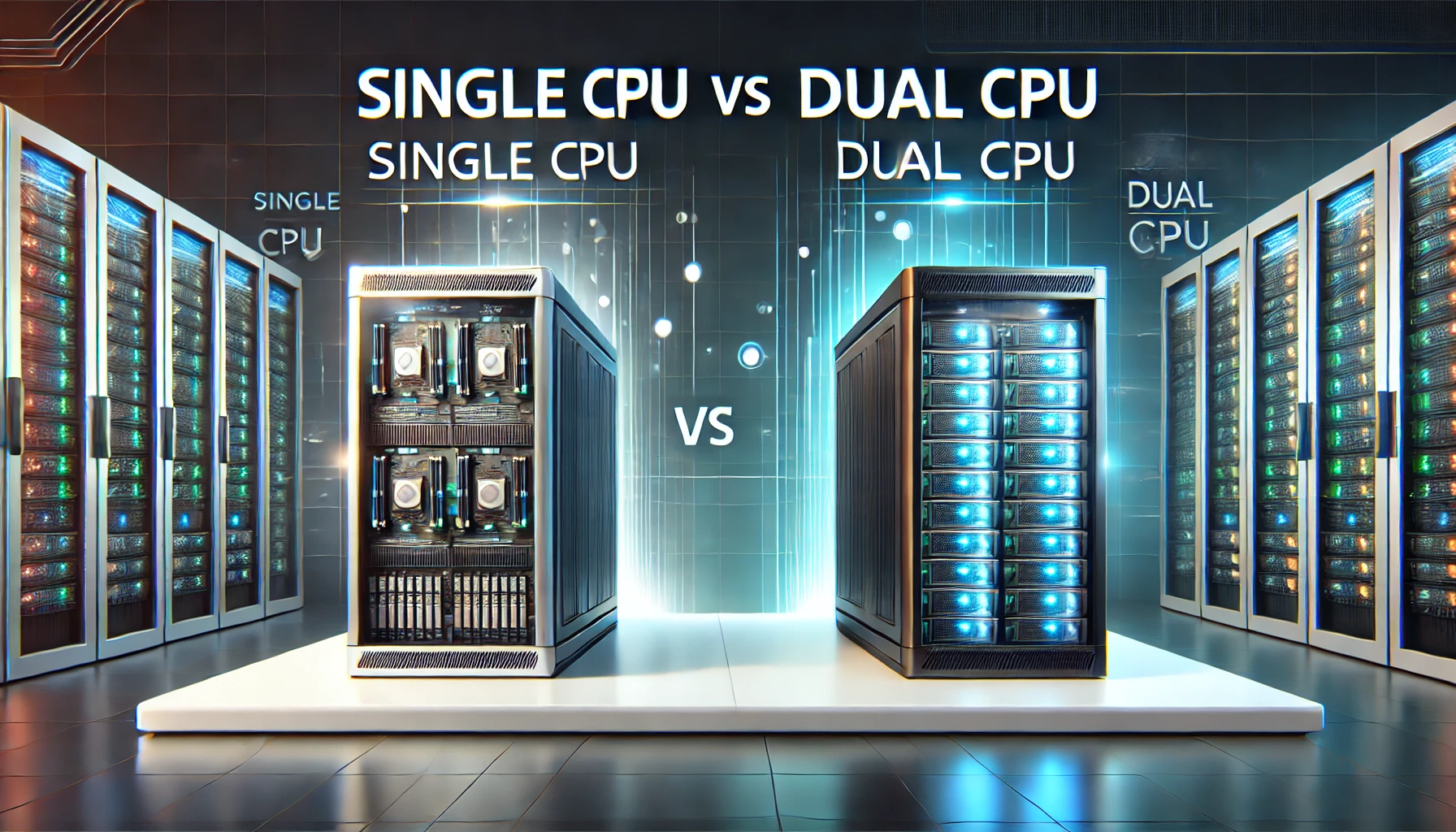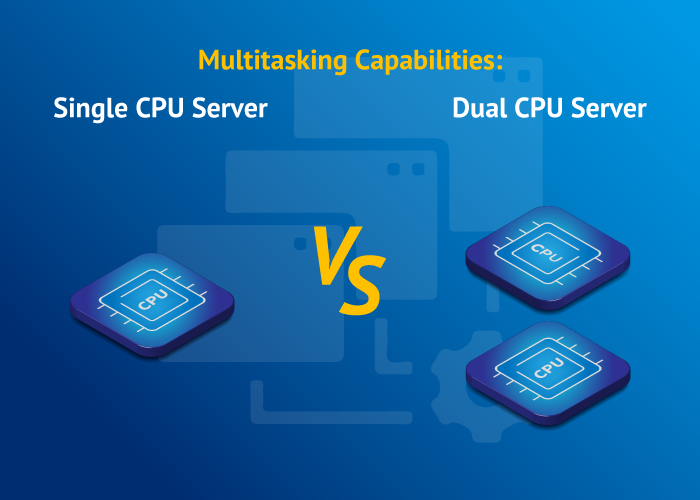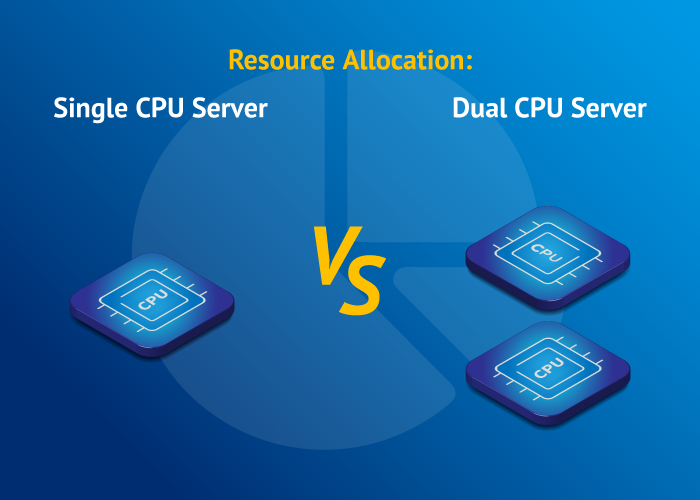
Single CPU Server vs Dual CPU Server
When choosing a server for your business or personal needs, one key consideration is whether to opt for a single CPU or a dual CPU server. Both configurations have distinct advantages, depending on your workload and performance requirements. A single CPU server offers simplicity, cost-effectiveness, and sufficient power for smaller applications or startups. On the other hand, a dual CPU server provides enhanced performance, scalability, and multitasking capabilities, making it ideal for resource-intensive tasks or enterprise-level applications. Understanding the differences between these options will help you select the right server to optimize performance and cost for your specific use case Single CPU Server vs Dual CPU Server.
Understanding CPU Servers
trying CPU servers is vital for choosing the right device to meet your commercial enterprise or venture wishes. When deciding on among a unmarried and dual CPU server, it is essential to endure in thoughts ordinary overall performance, scalability, and price range.
A Single CPU Server commonly makes use of one processor to handle all obligations. This kind of server is good for smaller companies or low-to-medium workload environments. It gives price financial savings and ease, however it would conflict with beneficial useful resource-heavy responsibilities or excessive visitors demands.
In comparison, a Dual CPU Server makes use of processors, allowing for higher managing of complex applications, heavy workloads, and multitasking. This setup is beneficial for companies that rely on facts-in depth operations like virtualization, database management, and excessive-traffic internet hosting. Dual CPU servers offer improved processing energy, redundancy, and extra scalability, making them a excellent preference for growing companies.
- Steps to Choose Between Single vs Dual CPU Server:
- Assess Workload Needs: If your programs are useful resource-extensive or require speedy information processing, a twin CPU server is a higher preference.
- Evaluate Budget: Single CPU servers are more price-effective, at the same time as twin CPU servers come at a better rate.
- Consider Future Growth: A dual CPU setup is better for scalability if your business enterprise is probably to increase all at once.
- Performance Requirements: For important systems that want immoderate uptime and overall performance, dual CPUs provide greater reliability and performance.
- Assess Workload Needs: If your programs are useful resource-extensive or require speedy information processing, a twin CPU server is a higher preference.
Main difference: Single CPU Server vs Dual CPU Server
The most essential difference between a Single CPU Server and a Dual CPU Server lies in processing strength and scalability. A Single CPU Server uses one processor to address all responsibilities. It is good for smaller workloads, decrease site visitors web sites, or groups with lots less resource-demanding applications. It gives a extra charge variety-friendly opportunity, making it ideal for startups or small establishments. However, its overall performance may also degrade at the same time as dealing with useful resource-intensive duties or large-scale operations.
In comparison, a Dual CPU Server includes processors, allowing for advanced multitasking, higher useful useful resource allocation, and better processing functionality. This configuration is right for companies with excessive-overall performance desires, along with internet website hosting, database manage, or virtualized environments. The dual CPUs make sure better redundancy, quicker information processing, and higher reliability, specifically in mission-vital applications.
- Steps to Choose: Single CPU vs Dual CPU: Which is better for web hosting?
- Evaluate Hosting Needs: For hosting excessive-traffic websites or jogging complex packages, a dual CPU server is higher perfect.
- Consider Traffic Volume: If you assume mild web site site visitors, a single CPU may additionally suffice, however better volumes name for dual CPUs.
- Budget: Single CPU servers are greater less costly, at the same time as twin CPU setups provide greater overall performance however at a better fee.
- Scalability: Dual CPUs offer higher scalability, important for organizations making plans to boom their website hosting requirements inside the future.
- Evaluate Hosting Needs: For hosting excessive-traffic websites or jogging complex packages, a dual CPU server is higher perfect.
Processing Power: Single CPU Server vs Dual
CPU Server
When evaluating Single CPU Server vs Dual CPU Server, processing electricity is one of the most big factors to take into account. A Single CPU Server relies on one processor to manage all responsibilities. This configuration is typically sufficient for businesses with mild processing desires, collectively with small websites or primary packages. It gives first rate overall performance at a decrease value however may also experience slowdowns below heavy workloads or excessive-call for environments.
On the other hand, a Dual CPU Server includes processors, successfully doubling the computational energy. This setup permits for better dealing with of resource-massive packages like massive databases, complicated virtual environments, or high-web site site visitors websites. With CPUs, those servers can address multiple obligations simultaneously, enhancing overall performance and reducing the threat of bottlenecks, making them high-quality for large-scale internet web hosting or employer-degree operations.
- Steps to Decide: Best Use Cases for Single CPU and Dual CPU Server
- Assess Workload Complexity: If your duties comprise high beneficial resource call for (e.G., virtualization, large records), a dual CPU server is greater appropriate.
- Consider Scalability: Dual CPU servers are higher for growing agencies, presenting greater processing electricity as your wishes increase.
- Traffic Volume: For heavy net web hosting or massive e-exchange systems, dual CPUs provide the needed bandwidth and processing.
- Budget Constraints: For easy packages or small groups, a unmarried CPU server might be the more cheap preference.
- Assess Workload Complexity: If your duties comprise high beneficial resource call for (e.G., virtualization, large records), a dual CPU server is greater appropriate.
Multitasking Capabilities: Dual CPU Server vs
Single CPU Server

When evaluating Multitasking Capabilities: Dual CPU Server vs Single CPU Server, the crucial element difference lies in how successfully every configuration can contend with more than one duties concurrently. A Single CPU Server makes use of a single processor to execute all methods, which limits its multitasking abilties. While it is right enough for easy or much much less demanding applications, heavy multitasking duties—at the side of walking multiple digital machines or web hosting big-scale databases—can reason overall performance bottlenecks.
In evaluation, a Dual CPU Server is designed for extra strong multitasking. With processors, it may cut up obligations among them, improving standard performance for useful resource-substantial packages. This configuration is especially useful for environments requiring simultaneous processing of huge datasets, going for walks numerous digital machines, or helping excessive-web site visitors web sites. By dispensing workloads across CPUs, a dual setup ensures smoother multitasking, advanced performance, and better regular system reliability.
For instance, an AMD Dedicated Server with twin processors gives even greater processing electricity and multitasking overall performance. AMD processors are recounted for their excessive middle counts and sturdy parallel processing talents, making them ideal for organizations that need to run multiple packages concurrently or require excessive-typical performance computing.
- Steps to Choose:
- Identify Multitasking Needs: If your responsibilities involve coping with a couple of heavy programs, a twin CPU server is extra suitable.
- Consider Server Type: Look for servers with AMD processors for advanced multitasking and parallel processing.
- Evaluate Budget: Dual CPU servers are extra high-priced, however the added normal overall performance blessings can also justify the price for large operations.
- Identify Multitasking Needs: If your responsibilities involve coping with a couple of heavy programs, a twin CPU server is extra suitable.
Cost: Single CPU Server vs Dual CPU Server
The rate is one of the most giant variations among a Single CPU Server vs Dual CPU Server. A Single CPU Server is normally greater much less high-priced, making it a exquisite desire for small organizations or startups with moderate processing goals. With fine one processor, the hardware and associated costs, together with electricity intake, are lower, making it price-powerful for famous packages like number one internet website hosting or report storage.
On the opposite hand, a Dual CPU Server comes with a better rate tag due to the extra processor, greater advanced hardware, and progressed electricity necessities. This configuration is right for large groups or more resource-extensive programs, like immoderate-performance computing or corporation-degree web website hosting. For example, an AMD Dedicated Server with twin CPUs offers notable rate, specially for duties requiring parallel processing or multitasking.
- Steps to Consider:
- Budget: Choose a single CPU server in case you’re working with a constrained price range.
- Application Needs: If you want better average overall performance, select a dual CPU server.
- Future Growth: Consider scalability—twin CPU servers can be a higher long-time period investment for expanding groups.
- Budget: Choose a single CPU server in case you’re working with a constrained price range.
Scalability: Dual CPU Server vs Single CPU Server
Scalability is a crucial issue while finding out among a Single CPU Server vs Dual CPU Server. A Single CPU Server is typically restricted in scalability due to the fact it is predicated on a unmarried processor to deal with all obligations. As your workload increases, you’ll likely revel in overall performance bottlenecks, and upgrading the server may incorporate changing the whole device. It’s suitable for small agencies with modest processing dreams.
On the alternative hand, a Dual CPU Server offers lots higher scalability. With processors, you could deal with larger workloads and scale sources extra successfully. This makes dual CPU servers best for companies experiencing increase or people with heavy, useful resource-sizable applications. For example, an AMD Dedicated Server with dual CPUs gives the energy wanted for virtual environments, large databases, and excessive-web site visitors net web sites, making sure better performance as your dreams evolve.
- Steps to Choose:
- Evaluate Growth: Consider destiny needs; in case you expect substantial increase, go with a dual CPU server.
- Current Demands: If your business is small and growth is minimum, a single CPU also can suffice.
- Long-term Investment: Dual CPU servers provide more flexibility for lengthy-time period scalability.
- Evaluate Growth: Consider destiny needs; in case you expect substantial increase, go with a dual CPU server.
Workload Suitability: Single CPU Server vs Dual CPU Server
When considering Workload Suitability: Single CPU Server vs Dual CPU Server, the crucial thing distinction is how properly each can deal with various kinds of workloads. A Single CPU Server is good for lighter, a whole lot much less complicated obligations like web hosting small websites, handling number one electronic mail servers, or handling simple programs. These servers perform nicely in environments where the demand for processing energy is low to mild.
In assessment, a Dual CPU Server is higher appropriate for extra annoying workloads, which encompass massive-scale databases, immoderate-visitors websites, or virtualization environments. The additional processor permits for inexperienced multitasking and better overall performance even as managing useful useful resource-heavy obligations. For example, a twin CPU server excels in organization-level operations or data facilities that require high availability and brief processing.
- Steps to Choose:
- Evaluate Your Workload: For mild responsibilities, a single CPU server is sufficient.
- Consider Performance Needs: For heavy workloads, choose a dual CPU server.
- Best Use Cases: Single CPU servers paintings properly for small-scale net hosting, on the equal time as dual CPU servers are better for excessive-overall performance, useful useful resource-worrying responsibilities.
- Evaluate Your Workload: For mild responsibilities, a single CPU server is sufficient.
Resource Allocation: Single CPU Server vs
Dual CPU Server

When it comes to Resource Allocation: Single CPU Server vs Dual CPU Server, the key distinction lies in how the server distributes duties and manages workloads. A Single CPU Server relies on one processor to deal with all tasks, that could occasionally cause overall performance bottlenecks if more than one beneficial aid-intensive programs are running concurrently. The CPU need to divide its time amongst all responsibilities, that can have an effect on overall performance at the same time as below heavy load.
In contrast, a Dual CPU Server has processors, allowing better distribution of workloads. Each processor can control separate duties, which complements multitasking, useful useful resource management, and common general performance. This setup is mainly useful for corporations that require fast processing and efficient coping with of more than one concurrent programs, such as in virtualized environments or big databases.
- Steps to Choose:
- Assess Workload Demand: For mild workloads, a unmarried CPU is ideal enough.
- Consider Efficiency Needs: For high-call for responsibilities, choose twin CPUs to ensure better useful aid allocation.
- Evaluate Multitasking: Dual CPU servers take care of a couple of packages extra correctly, reducing the hazard of bottlenecks.
- Assess Workload Demand: For mild workloads, a unmarried CPU is ideal enough.
Fault Tolerance: Single CPU Server vs Dual
CPU Server
When evaluating Fault Tolerance: Single CPU Server vs Dual CPU Server, the difference in reliability is tremendous. A Single CPU Server is based on a unmarried processor, meaning that if the CPU fails, the complete tool goes down. This can bring about longer downtimes and information loss, making it a whole lot much less appropriate for task-crucial packages that require immoderate availability.
On the other hand, a Dual CPU Server gives better fault tolerance as it has two processors. In case one CPU fails, the opposite can preserve jogging, permitting the machine to live operational till the hassle is resolved. This redundancy improves uptime and ensures non-stop service, making twin CPU servers a preferred preference for organizations that require high reliability, consisting of in information facilities or hosting environments.
- Steps to Choose:
- Assess Risk Tolerance: For vital systems, choose a twin CPU server for delivered fault tolerance.
- Consider Downtime Impact: If uptime is vital, twin CPUs provide backup in case of failure.
- Evaluate Budget: While dual CPU servers offer better fault tolerance, they arrive at a better rate.
- Assess Risk Tolerance: For vital systems, choose a twin CPU server for delivered fault tolerance.
Virtualization: Single CPU Server vs Dual CPU
Server
When it involves Virtualization: Single CPU Server vs Dual CPU Server, the crucial aspect distinction is in processing energy and the capability to address a couple of virtual machines (VMs). A amd dedicated server can be enough for taking walks one or two mild-weight VMs, however as you upload greater virtualized environments or more beneficial useful resource-heavy applications, the server have to emerge as overloaded, main to slower performance and functionality system instability.
In evaluation, a amd dedicated server offers higher performance for virtualization. With processors, it may allocate property greater efficiently, permitting the easy operation of multiple VMs simultaneously. This configuration is ideal for groups that rely upon virtualized environments for cloud web hosting, trying out, or development. The extra CPU guarantees higher processing energy and higher aid control, allowing for seamless multitasking and stepped forward scalability.
- Steps to Choose:
- Assess Virtualization Needs: For slight virtualization, a single CPU server can also moreover suffice.
- Consider VM Load: For on foot a couple of VMs or heavy workloads, pick a dual CPU server.
- Plan for Scalability: A dual CPU setup will offer better scalability for developing virtual environments.
- Assess Virtualization Needs: For slight virtualization, a single CPU server can also moreover suffice.
F.A.Q
Here are 3 frequently asked questions (FAQ) related to Single CPU Server vs Dual CPU Server:
What is the principle distinction between a unmarried CPU and dual CPU server?
The most vital distinction is in processing power. A Single CPU Server makes use of one processor to deal with all tasks, making it greater rate-effective however less suitable for heavy workloads. A Dual CPU Server has processors, supplying accelerated power, better multitasking, and improved general overall performance for useful aid-in depth applications, along with immoderate-web page traffic web web sites or virtualized environments.
When need to I pick out a dual CPU server over a single CPU server?
Choose a twin CPU server if your company or software calls for high normal overall performance, handles heavy workloads, or runs more than one digital machines. It’s best for environments that name for excessive availability, fault tolerance, and scalability. A single CPU server is suitable for smaller groups or packages with mild useful resource requirements.
Can a unmarried CPU server address virtualization?
Yes, a unmarried CPU server can manage virtualization, however its basic performance may degrade with a couple of digital machines (VMs) or aid-significant duties. For greater inexperienced virtualization, a twin CPU server is recommended as it presents the processing electricity had to run several VMs concurrently with out universal overall performance problems.
CONCLUSION
In end, the choice among a Single CPU Server and a Dual CPU Server depends to your precise needs and workload necessities.
A Single CPU Server is a finances-pleasant choice ideal for smaller workloads and programs with moderate processing demands. It delivers dependable overall performance whilst being power-green and less complicated to manage, making it a sensible desire for small agencies or much less intensive duties.
In contrast, a Dual CPU Server is designed for useful resource-heavy environments, supplying superior performance, scalability, and multitasking talents. With double the processing strength, it effectively handles complex computations, virtualization, and high-call for workloads, making it the desired answer for firms or growing businesses with critical overall performance desires.


Leave a Reply